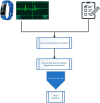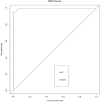Sensor-Assisted Weighted Average Ensemble Model for Detecting Major Depressive Disorder
- PMID: 31698678
- PMCID: PMC6891280
- DOI: 10.3390/s19224822
Sensor-Assisted Weighted Average Ensemble Model for Detecting Major Depressive Disorder
Abstract
The present methods of diagnosing depression are entirely dependent on self-report ratings or clinical interviews. Those traditional methods are subjective, where the individual may or may not be answering genuinely to questions. In this paper, the data has been collected using self-report ratings and also using electronic smartwatches. This study aims to develop a weighted average ensemble machine learning model to predict major depressive disorder (MDD) with superior accuracy. The data has been pre-processed and the essential features have been selected using a correlation-based feature selection method. With the selected features, machine learning approaches such as Logistic Regression, Random Forest, and the proposed Weighted Average Ensemble Model are applied. Further, for assessing the performance of the proposed model, the Area under the Receiver Optimization Characteristic Curves has been used. The results demonstrate that the proposed Weighted Average Ensemble model performs with better accuracy than the Logistic Regression and the Random Forest approaches.
Keywords: correlation-based feature selection; major depressive disorder; random forest; smartwatch sensor; weighted average ensemble.
Conflict of interest statement
The authors declare no conflict of interest.
Figures









References
-
- Mahendran N., Vincent D.R. Effective Classification of Major Depressive Disorder Patients Using Machine Learning Techniques. Recent Pat. Comput. Sci. 2019;12:41–48. doi: 10.2174/2213275911666181016160920. - DOI
MeSH terms
Grants and funding
LinkOut - more resources
Full Text Sources
Other Literature Sources

